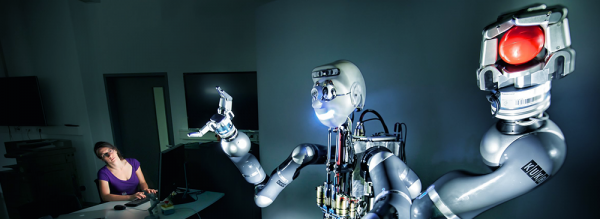

Perception - Learning - Action
Intelligent Systems... - nature is full of them. Nowadays, the number of artificial intelligent systems is growing in many areas of high societal relevance, such as within the Internet, in mobility and manufacturing, or in healthcare.
Through interaction, evolution, and learning, biological systems have developed sophisticated abilities in order to act successfully in complex environments. With theoretical and algorithmic work, as well as physical systems ranging from nano to macro scales, the researchers at the Max Planck Institute for Intelligent Systems investigate issues of perception, action, and learning. They want to use this understanding to design future systems.
While Machine Learning techniques play a key role in the Institute's research, the scientists at the MPI for Intelligent Systems Tübingen study fundamental problems of Empirical Inference, Computer Vision and Robotics in various research groups.
The MPI for Intelligent Systems has two locations. In Stuttgart, the research focuses on small-scale artificial intelligent systems and new material systems. Although the focus lies on basic research, there is a high potential for practical applications, as in new software codes, robot technologies and medical technology.
A pioneering research network in learning systems is being established between MPI-IS and ETH Zurich. This is the first cooperation of its kind between the Max Planck Society and the ETH. Joint research projects, scientific events and education of PhD Students will strengthen the research in Machine Learning, Perception, Robotics, and Micro- and Nanorobotics.

Tübingen is a special place for research. Very few locations offer such a wide range of research areas in such close proximity - both physically and figuratively. Not only are all of Tübingen's research institutions just a stone's throw away from each other, they also collaborate closely within the Tübingen Research Campus.
Visit page
Life in Tübingen is life in the heart of Europe and in one of Germany's most scenic and economically competitive regions. It's a bustling mediaeval town with a young, international, and vibrant population and a rich cultural and artistic scene. Lectures, concerts, film festivals, and more: life in Tübingen never gets boring.
Visit page
The Neurosciences in Tübingen with more than 100 active research groups have the potential to rank among the most successful neuroscientific sites in Europe.
Visit page